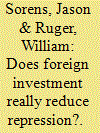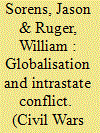| Srl | Item |
| 1 |
ID:
117531


|
|
|
|
|
| Publication |
2012.
|
| Summary/Abstract |
Cross-national empirical studies have found that foreign investment has beneficial effects on human rights. We argue that these studies poorly operationalize foreign investment to test theoretical predictions and suffer from sampling bias. We demonstrate that investment stock, rather than inflow, is the superior operationalization of structural dependence theory. We construct regression models of government repression of physical integrity rights, include much more data than previous studies, and use a new multiple imputation algorithm for time-series cross-section data to resolve sampling bias. We find no evidence that foreign investment affects repression, contradicting conventional wisdom and suggesting that the political gains from repression frequently dwarf any economic costs for governments.
|
|
|
|
|
|
|
|
|
|
|
|
|
|
|
|
| 2 |
ID:
141471


|
|
|
|
|
| Summary/Abstract |
How does globalisation, especially foreign direct investment, influence the risk of intrastate conflict? While several prominent studies have found that globalisation reduces the probability of civil war, we use new data and methods to approach the question. In particular, we test for the possibility that foreign investment is endogenous to conflict risk and appropriately use inward foreign investment stock rather than net inflow to measure an economy's exposure to international capital markets. We find no evidence that foreign investment affects civil conflict, suggesting that governments' fundamental security interests trump the economic losses they can expect to suffer from failing to compromise with potential rebel groups.
|
|
|
|
|
|
|
|
|
|
|
|
|
|
|
|
| 3 |
ID:
178354


|
|
|
|
|
| Summary/Abstract |
Military service is a highly social—and potentially socializing—experience. However, the long-term social effect of military service is a little-studied topic, and some have dismissed any direct impact of service on civic participation. Using data from a large, national survey, our estimates show, in contrast, that the likelihood and intensity of group participation is higher among veterans than other men and that combat veterans have the highest level of participation. Mettler argued that education funded through the GI Bill gave veterans both resources (“civic capacity”) and a desire to reciprocate to society (“civic predisposition”) for the generous benefits they received, but she did not allow for the possibility that service itself could also increase both civic capacity and predisposition. Furthermore, our estimates confirm that education is strongly associated with higher civic participation and that the association between military service and participation is largely independent of education.
|
|
|
|
|
|
|
|
|
|
|
|
|
|
|
|